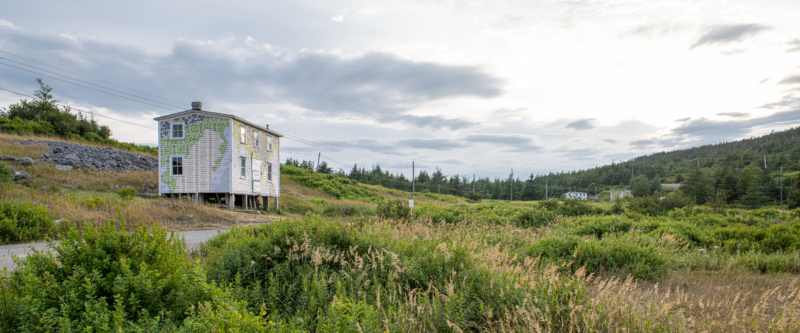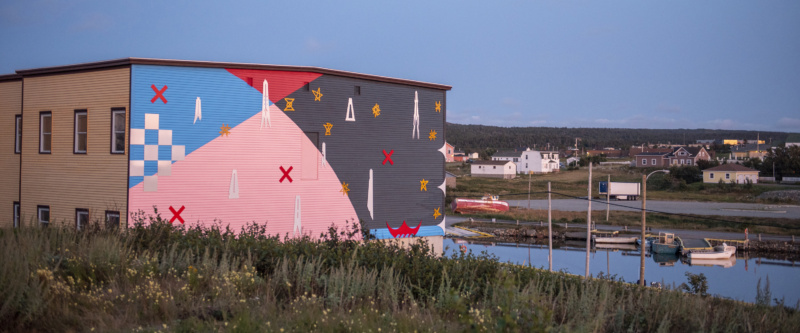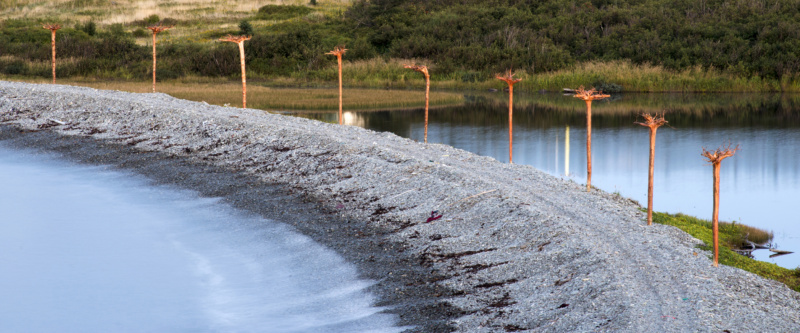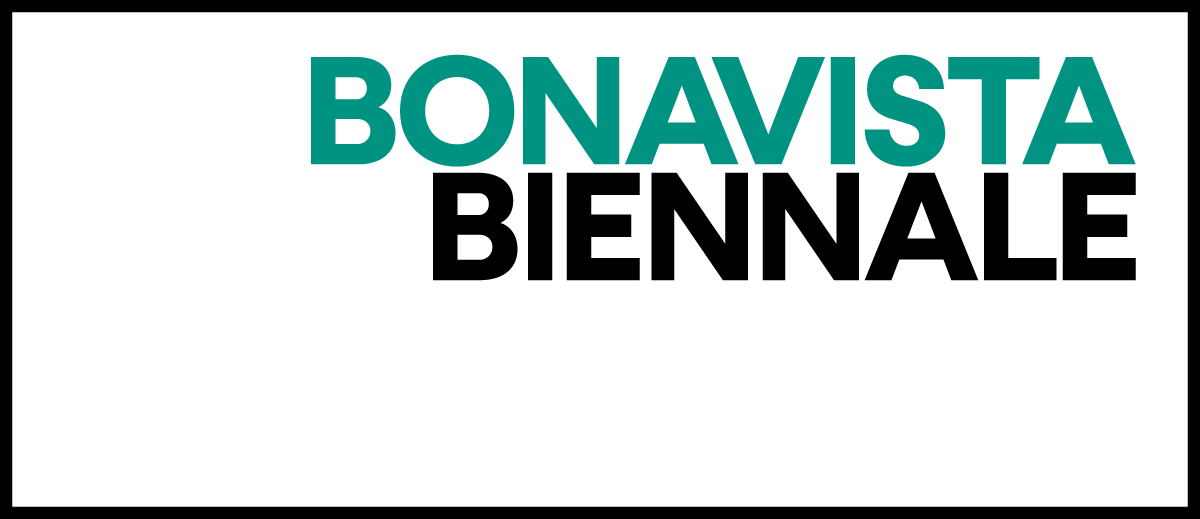Born in the North, Provider, 2023 installation
Port Rexton Brewery
Born in The North is a creative studio owned and operated by twin brothers Chris and Greg Mitchell, based in Toronto. They have advanced their creative capacity with public art projects, fashion, music and unique commissions. Their new mural for the Bonavista Biennale, Provider, is based on the ideas of interconnectedness and working together. It is inspired by combining their lived experience and relationship with and between Mi’kmaq and Woodland place-based cultures and design aesthetics.
Their mural highlights symbolic and sacred relationships integral in the natural world and significant to Ktaqmkuk (Newfoundland). Born In The North’s brightly colored larger-than life stylized renderings of a caribou, black bear and loon acknowledges the essential offerings and reciprocity granted between these beings/animals and the people. Provider honours the sustenance, guidance and influence offered by these animals, who have become woven into Mi’kmaq history and representations of the inhabitants on the lands across Newfoundland and much respected by the Qalipu Nation.
—Ryan Rice, 2023 Bonavista Biennale Co-Curator
ABOUT THE ARTISTS
Born In The North is a creative studio owned and operated by twin brothers Chris and Greg Mitchell, based in Toronto. Their work is created through their own unique lens and is focused on examining the relationship between humans and nature. Taking into account their own story and lived experiences, inspiration is drawn from their Mi’kmaq heritage, music exploration, and Canadian upbringing. Their recent projects include a commissioned mural for the 2022 Up Here festival in Sudbury; Turtle & The Traveler (2022) a public art installation in Downsview Park, Toronto; and a “flip” of the York United FC logo that honours the history and culture of the Indigenous people of the York Region in Ontario.

Marcia Huyer, strata, 2021, mural on exterior of house. Commissioned by the 2021 Bonavista Biennale. Photo: Brian Ricks.
Marcia Huyer, strata, 2021 installation
The Matthews House, Duntara
In conceiving of strata, Marcia Huyer drew upon a quintessential aesthetic of the Bonavista Peninsula and historic houses in Newfoundland: the tattered layers of wallpaper built up over decades of lives lived in these cherished family spaces. These layers of patterned paper are the ephemeral remains of efforts to decorate, eroded and made frail by the passage of time. Exhuming and expanding this decorative domestic residue, Huyer adroitly flips the interior onto the exterior of a classic Newfoundland saltbox house. In doing so, through strata Huyer places the slightness of human action, a historic material accrual of domestic settler occupation, against the grand scale and unrelenting natural forces of the Bonavista Peninsula.
Primarily working in sculpture and installation, Huyer’s practice often makes the intangible substantial, shifting perception and consciousness in the process. strata mines a tension in history, between settler efforts to subjugate space and land to Euro-centric notions of beauty, and the unyielding primacy of the natural world. This primacy is acutely felt on an island and peninsula buffeted by the unrelenting force of the North Atlantic. Often the houses in which the layered fragments of wall-paper are found have a history of human displacement precipitated by state relocation programs or decline of the fishery—which is true of Duntara, the community where Huyer’s installation is based.
Efforts to make the town of Duntara aware of the project resulted in community members interacting with Huyer and her installation team, contributing through painting or providing examples drawn from their own homes.
—Matthew Hills, 2021 Bonavista Biennale Co-Curator
ABOUT THE ARTIST
Marcia Huyer is a sculptor and installation-based artist. She received an MFA from the University of Victoria and graduated from the Sculpture/Installation program at the Ontario College of Art and Design. She has exhibited across Canada, including Art Gallery of Greater Victoria, Eastern Edge Gallery, Artcite Inc. and ODD Gallery. Huyer has participated in several art festivals, such as: Scotiabank’s Nuit Blanche, Toronto; CAFKA 07 and CAFKA 18, Kitchener (ON), in/future Art Festival, Ontario Place, Winter Lights, Ontario Place and CB Nuit, Corner Brook, NL.

Jordan Bennett, Pi’tawe’k, 2019, acrylic paint on wall, 3M Diamond Grade reflective prints on Alupanel. Installation view, 2019 Bonavista Biennale. Photo: Brian Ricks.
Jordan Bennett, Pi’tawe’k, 2019 installation
Dr. Hilda Tremblett Wellness Centre, Bonavista
Jordan Bennett’s practice utilizes a wide range of approaches to art-making—painting, sculpture, video, and sound—to explore ideas of land, language, the act of visiting and familial histories. With a focus on the Mi’kmaw and Beothuk visual culture of Ktaqamkuk, his work challenges colonial perceptions of Indigenous histories, stereotypes and presence.
Bennett’s large-scale mural titled Pi’tawe’k—meaning “he/she is upriver” in the Mi’kmaw language—draws upon his research and understanding of Mi’kmaw and Beothuk artforms. Responding to the site as a hub for social interaction, as with his previous work, this new composition engages in a conversation between the past and the present by expanding upon traditional designs and iconography from both cultures. Among other imagery, this includes silhouettes of Beothuk caribou bone pendants found near the town of Bonavista, a Beothuk canoe, references to Mi’kmaw basketry motifs, and star-like shapes based on ancient petroglyphs from Kejimkujik National Park and Conception Bay South. Painted elements alongside reflective prints on metal panel—materials commonly used for road signage—promote a sense of presence and act as a guiding beacon throughout all hours of the day and night (in the evening, the reflective components are illuminated by the headlights of passing vehicles).
Deeply rooted in the Indigenous legacies of the immediate locale and region, Pi’tawe’k tells a story that runs counter to the dominant narratives of history and place. In doing so, this work celebrates, if not firmly reasserts, the enduring connection to this land that has been maintained by the Mi’kmaq and Beothuk Nations since time immemorial.
—David Diviney, 2019 Bonavista Biennale Co-Curator
ABOUT THE ARTIST
Jordan received his BFA from Memorial University of Newfoundland and his MFA in Visual Arts from the University of British Columbia Okanagan. In the past 10 years, he has been in over 75 group and solo exhibitions nationally and internationally at venues such as the National Museum of the American Indian, the Art Gallery of Nova Scotia and the Musée d’art contemporain de Montréal, and was one of two artists to represent Newfoundland and Labrador in the 2015 Venice Biennale. He has received several awards and honours—most notably, short-listed for the 2018 Sobey Art Award, a Hnatyshyn Foundation REVEAL award and presented with the 2014 Newfoundland and Labrador Arts Council’s Artist of the Year.

Reinhard Reitzenstein, Waiting / Watching / Waiting, 2017. Photo: Brian Ricks.
Reinhard Reitzenstein, Waiting / Watching / Waiting, 2017 installation
Knight’s Cove Beach
An ambitious site-specific sculptural installation, Waiting / Watching / Waiting is a 2017 Bonavista Biennale favorite that took an entire village to make. Reitzenstein’s trees, carefully selected for their height and strength stand like sentinels on a rise, gazing out to sea. The distance between each tree is substantial, creating a canopied allée on the curving crest of the barachois.
Reitzenstein consistently explores ways to interconnect nature, culture, science and technology. For this piece, he chose a specific site: a barachois is a geological feature of coves in coastal regions of Newfoundland that separates sweet water ponds from the sea. Some are used as causeways, others house fishery buildings called “stages” and “stores”. When not maintained these structures crumble and are absorbed back into nature. The exposed tree roots are intertwined like the fate of generations of Newfoundland inhabitants.
—edited excerpt, Catherine Beaudette, 2017 Bonavista Biennale Co-Curator
ABOUT THE ARTIST
Reinhard Reitzenstein has held over 100 solo exhibitions and participated in some 300 group exhibitions in North America and abroad. He has completed over 20 public art commissions and his work is represented in over 50 public and corporate collections internationally, including the National Gallery of Canada, AGO, University of Toronto, University of Western Ontario, Teutloff Collection in Germany, City of Pirkkala in Finland, City of Toronto Parks, and the National Capital Commission. Reitzenstein is Director of the Sculpture Program, State University of New York, Buffalo.
